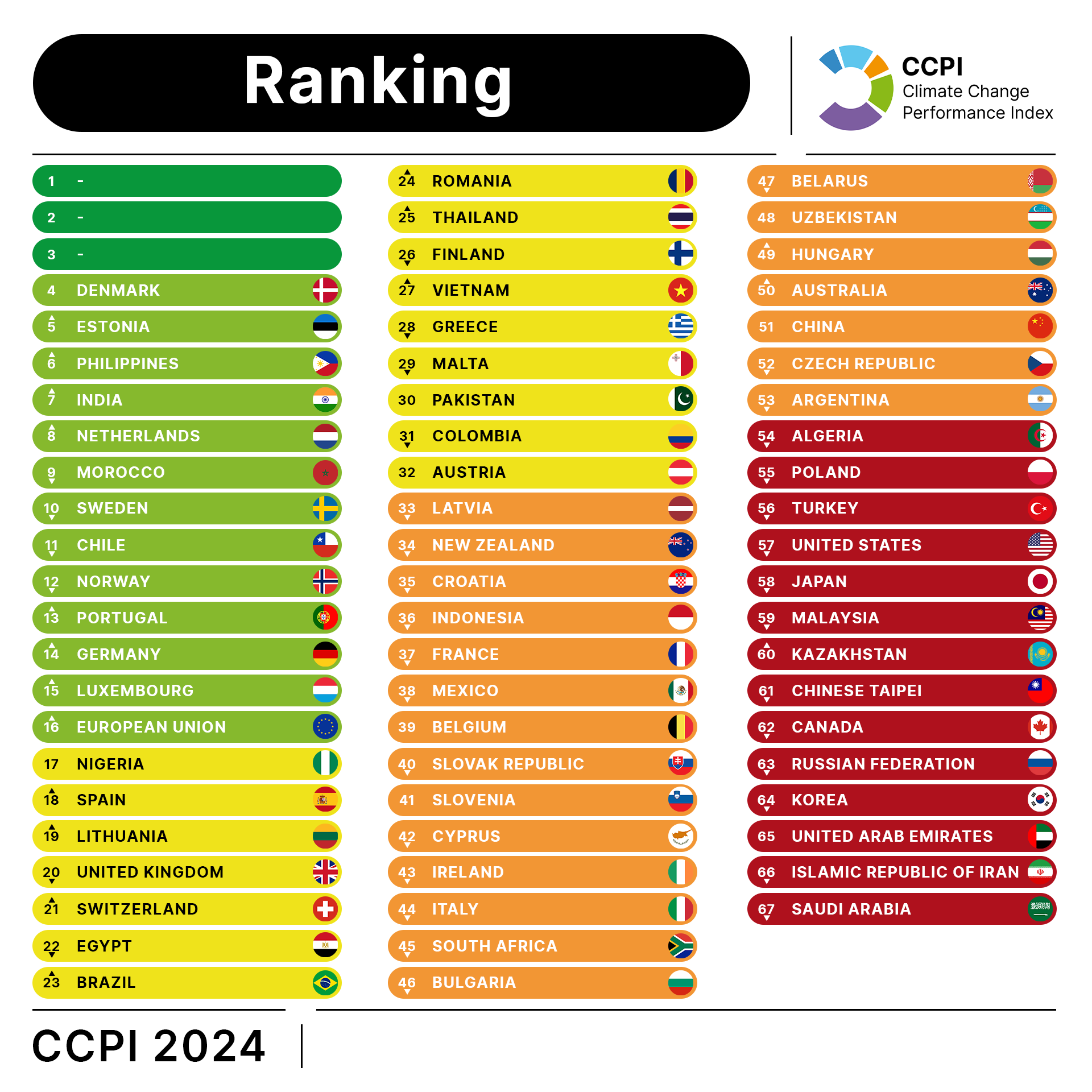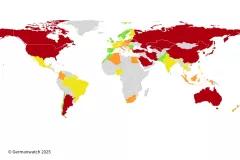For the 19th time in a row, Germanwatch, NewClimate Institute, and CAN International publish the Climate Change Performance Index (CCPI).
- Climate policies stagnated in many countries since last year
- Denmark, Estonia and Philippines on top of the CCPI
- Oil-producing countries, including COP host United Arab Emirates, rank at the bottom
- Brazil and Vietnam among the best climbers – Italy and the UK falling behind
- World’s biggest emitters: No change in ranking for China, US still at the bottom
Dubai (8 Dec 2023). Today, Germanwatch, NewClimate Institute, and CAN International published the Climate Change Performance Index (CCPI) 2024. It monitors the climate mitigation progress of 63 countries and the European Union, together responsible for more than 90% of global emissions. In recent years, governments around the world have increasingly placed climate action on their agenda, and renewable energy is booming in many countries. However, this still is not enough. The race against time continues: global emissions must nearly halve by 2030, and reducing the use of fossil fuels should account for most of that.
As in previous years, the top three places remain empty. Not a single assessed country has taken action in line with the 1.5-degree limit. Nevertheless, there are big differences in ambition: Denmark is at the top of the index again (4th), followed by the climbers Estonia and Philippines (5th and 6th). Unfortunately, not everyone follows this good example: China, the largest emitter, remains in 51st place, while the US has even dropped five places since last year (now 57th). The host of COP28, the United Arab Emirates (UAE), Iran, and Saudi Arabia form the bottom trio (ranked 65th to 67th).
Jan Burck (Germanwatch), one of the CCPI authors, comments:
‘Some countries do quite well in single categories, but no country is consistently a “high” or “very high” performer. The average is simply not enough for a path to 1.5 degrees. Countries must build on existing measures and targets and multiply their efforts. Hereby COP 28 plays a crucial role. A binding decision to triple Renewable Energy capacity, double energy efficiency and drastically reduce the use of coal, oil and gas until 2030 could pave the way for a path aligned with the Paris climate targets.’
Co-author Prof. Niklas Höhne (NewClimate Institute) adds:
‘We see two competing developments: on the one hand renewables boom and governments have continuously updated their renewable energy targets. On the other hand climate policy making in general slowed down. For the first time, not a single country ranks “high” in the category climate policy. Even in countries with relatively ambitious climate policies – such as Denmark where climate action has nearly paused since the national elections in October 2022. This threatens the national emission reduction targets for 2025 and 2030.’
India, the world’s most populous country, ranks 7th in this year’s CCPI, mainly due to relatively low per capita emissions and low per capita energy consumption. There has been a positive expansion of renewables, but the country remains highly dependent on coal. ‘India needs to increase its share of renewable energy and reduce the dependency on fossil fuels. India’s Renewable targets for 2030 remain too low.’ says Höhne.
China stagnates – US still at the bottom
The biggest emitter China stagnates at the 51st place among the ‘low’ performing countries. Although China has a strong growing renewable energy sector and improves energy efficiency measures, it is among the nine countries responsible for 90% of global coal production. It also plans to increase its gas production by 2030.
USA (57th), the second biggest emitter, is still not on track. Burck explains ‘Our experts from the US welcome the climate relevant Inflation Reduction Act that led to significant investments in renewable energy. But more concrete implementation policies in all sectors are needed. However, the disastrous climate policy record of the first Trump administration raises fears that a potential new Trump administration would make the picture even worse.´
With India, Germany (14th), and the EU (16th), only three G20 members are among the ‘high’ overall performers in the CCPI 2024. Fifteen G20 countries receive an overall ‘low’ or ‘very low’. Canada (62nd), Russia (63rd), South Korea (64th), and Saudi Arabia (67th) remain the G20’s worst performing countries. Saudi Arabia’s per capita greenhouse gas emissions are rising steadily. Its share of renewable energy in total primary energy supply is close to zero, and the countries targets are too low.
However, one G20 country has improved significantly, becoming one of the top climbers. Brazil climbs a full 15 places to 23rd. As expected, the change in the Brazilian presidency has had a positive impact. Under President Lula, Brazil is pursuing more progressive climate policy, both internationally and nationally. However, experts from the country point out that Brazil at the same time is still expanding its fossil fuel production and could miss its climate targets. Jan Burck concludes: ‘The developments in Brazil are promising, but the G20 as a whole must significantly accelerate the expansion of renewables and phase-out all fossil fuels as soon as possible. The G20 has a special responsibility for high climate ambition, as it accounts for around 80% of global greenhouse gas emissions.’
UK falls in rank after climate policy rollback
The United Kingdom has slipped down the rank from 11 to 20. The UK government under Prime Minister Sunak has rolled back on several pieces of climate legislation. Thea Uhlich (Germanwatch), co-author of the CCPI: ‘What’s happening in the UK is exactly the opposite of what we need. Instead of phasing out fossil fuels, the government is increasing domestic fossil fuel extraction by approving a new coal mine and granting hundreds of new oil and gas licences in the North Sea.' The UK has long been one of the top-ranked countries in the index, but its weakened climate policy has led to a significant drop.
Poland (54th), another European country, performs overall ‘very low’ and is therefore the only EU-country with this rating. If a new Polish government will increase its climate policy ambition, the country could potentially have a better rating next year.
In 2023, the EU adopted the Fit For 55 package, with a series of measures aimed at improving the EU’s climate and energy legislation. It aims to achieve a 55% net emissions reduction by 2030 and climate neutrality by 2050. ‘While the EU is likely to meet its 2030 emission reduction target, the target level of reduction is not ambitious enough to keep the EU in line with the Paris Agreement,’ says Uhlich.
The COP host UAE (65th), is one of the lowest performing countries. The country’s performance disappoints in three out of four categories, particularly its high per capita emissions (25.9 tonnes) and the low share of renewable energy (less than 1%). Other oil-producing countries are at the bottom too, such as Russia (63rd), Iran (66th), Saudi Arabia (67th), and Canada (62nd).
Janet Milongo, Senior Officer, Climate Action Network International, states: ‘The CCPI shows once again that the biggest fossil fuel producers and exporters fair the worst in the index. This adequately founds out demands for phase out of all Fossil Fuels, full fast forever and funded, without any room for any dangerous distractions. All states should be focusing all their efforts and finance towards scaling up to 100% renewable energy systems in a just, equitable and rapid manner.’








